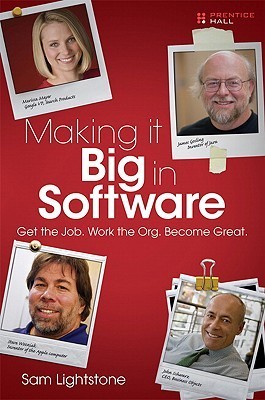What do you think?
Rate this book


Here’s all the information you need to jumpstart your software career: the best ways to get hired, move up, and blaze your way to the top! The software business has radically changed, and this book reveals today’s realities–everything your professors and corporate managers never told you. In his 20 years at IBM as a software architect, senior manager, and lead programmer, Sam Lightstone has briefed dozens of leading companies and universities on careers, new technology, and emerging areas of research. He currently works on one of the world’s largest software development teams and spends a good part of his time recruiting and mentoring software engineers. This book shares all the lessons for success Sam has learned…plus powerful insights from 17 of the industry’s biggest stars. Want to make it big in software? Start right here!
Discover how to
• Get your next job in software development
• Master the nontechnical skills crucial to your success
• “Work the org” to move up rapidly
• Successfully manage your time, projects, and life
• Avoid “killer” mistakes that could destroy your career
• Move up to “medium-shot,” “big-shot,” and finally, “visionary”
• Launch your own winning software company
Exclusive interviews with
•Steve Wozniak, Inventor, Apple computer
• John Schwarz, CEO, Business Objects
• James Gosling, Inventor, Java programming language
• Marissa Mayer, Google VP, Search Products and User Experience
• Jon Bentley, Author, Programming Pearls
• Marc Benioff, CEO and founder, Salesforce.com
• Grady Booch, IBM Fellow and co-founder Rational Software
• Bjarne Stroustrup, Inventor, C++ programming language
• David Vaskevitch, Microsoft CTO
• Linus Torvalds, Creator, Linux operating system kernal
• Richard Stallman, Founder, Free software movement
• Peter Norvig, Google’s Director of Research
• Mark Russinovich, Microsoft Fellow and Windows Architect
• Tom Malloy, Adobe Chief Software Architect
• Diane Greene, Co-founder and past CEO of VMware
•Robert Kahn, Co-inventor, the Internet
• Ray Tomlinson, Inventor, email
456 pages, Paperback
First published January 1, 2010